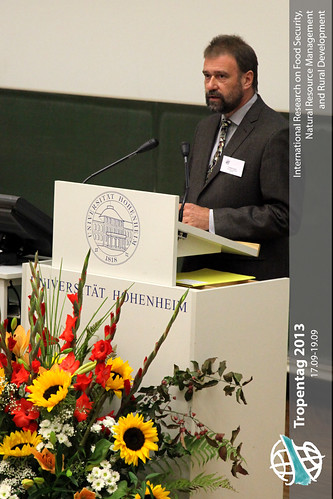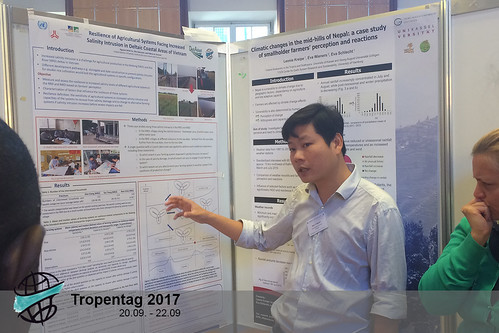food security
Malnutrition in Africa: Oh, the Irony!
Fri, 09/22/2017 - 12:05 — lizkusiaIt is 8:00 a.m. and I am already at the Agrobiodiversity and Nutrition diversity poster session. Today, I am doubling as a student reporter and a poster presenter. The room is filled with enthusiastic faces, hungry for information on the topic. The session started on high note with a presentation on potato farming in Peru. However, something caught my eye throughout the presentations. All the other topics, including mine were about Africa. One of the speakers swept me away with his research on biofortification of cassava. This is good news! However, allow me to talk about the other side of the story.

Diverse Approaches to Understanding Farmers’ Perception
Thu, 09/21/2017 - 14:19 — Hana KhanhStarting very early in the morning of the second day of Tropentag 2017, the poster sessions on Risk and Awareness still attracted many people. It is good news that this year many presented research focused on understanding the farmers’ perception through different approaches. It also made the session more interesting with lots of discussions.
While Akary Min investigated how farmers adapt to climate change in the Central Dry Zone of Myanmar, Amie Heri-Kazi Bisimwa from Eastern of DR Congo was more inclined towards the farmers’ perceptions of land degradation in South Kivu. And Minh Tu Nguyen has been currently working on the subjective measurement of resilience of agricultural systems to increased salinity intrusion in Vietnam. More surprisingly, Emily Mutota tried to apply a new method, ‘’photovoice’’, in which she attempted to understand the perception of the local community about their own habitats by asking them to expressing it through the photos they captured. Even though, personally, I was not able to find many promising results from this research, her attempts with a new approach should be appreciated.
"Nutrition & Food Security are Our Topics"
Sat, 09/19/2015 - 11:18 — Philip TestroetI talked to Mr Siegfried Harrer of the Federal Office for Agriculture and Food (BLE) – an office that is subordinate to the Federal Ministry of Food and Agriculture (BMEL) with German Federal Minister for Food and Agriculture Schmidt. BMEL is one of the donors of Tropentag 2015. Harrer said that BMEL is spending 8.5 million Euros on 8 different science projects this year. The main interest of BLE being at Tropentag is to get in contact with other organizations and researchers. They organize workshops for local farmers around the world. Furthermore they have upcoming possibilities for young scientists from developing countries to get grants. 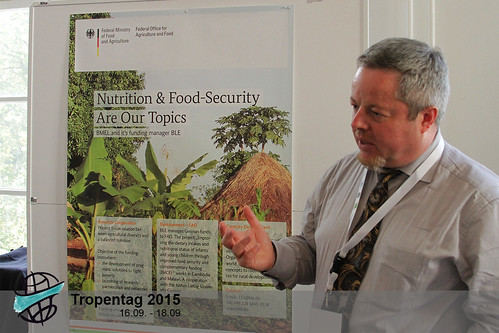
Echoes of Voices from around the World at Registration this Morning
Wed, 09/17/2014 - 12:43 — Helen SitarBridging the gender gap
Thu, 09/26/2013 - 01:36 — Louisa Wong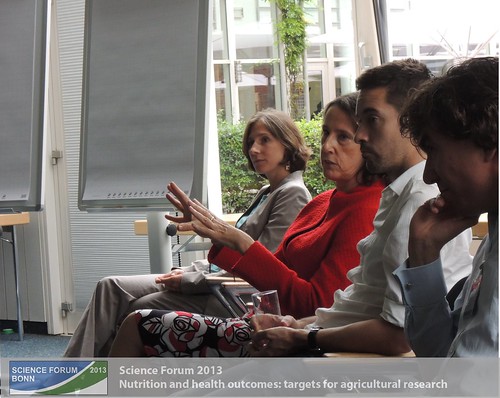 Lynn Brown was sharing her point of view about gender sensitive agriculture in the Breakout session about under-nutrition
Lynn Brown was sharing her point of view about gender sensitive agriculture in the Breakout session about under-nutrition
"The Silver Bullet" for the "The Cinderella Sector"
Wed, 09/25/2013 - 12:54 — Pamella Ogada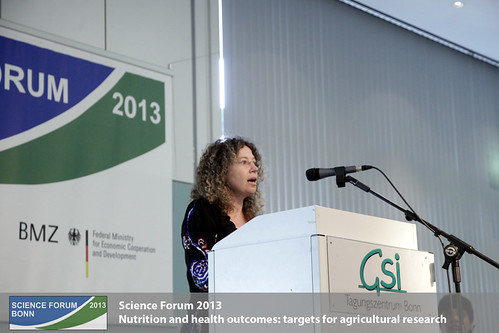 Delia Grace, International Livestock Research Institute (ILRI)
The suggested way to addressing food safety being from farm to folk, which includes the long chain from production to consumption, this includes; from harvesting, to the informal markets, to the storage, as well as areas of waste. Mycotoxins, which are very toxic fungus found in major crops and have been reported to contaminate over 25% of the world produce, are of great interest to researchers.
Delia Grace, International Livestock Research Institute (ILRI)
The suggested way to addressing food safety being from farm to folk, which includes the long chain from production to consumption, this includes; from harvesting, to the informal markets, to the storage, as well as areas of waste. Mycotoxins, which are very toxic fungus found in major crops and have been reported to contaminate over 25% of the world produce, are of great interest to researchers.
AT A GLANCE!! - Science Forum 2013
Tue, 09/24/2013 - 17:50 — Pamella Ogada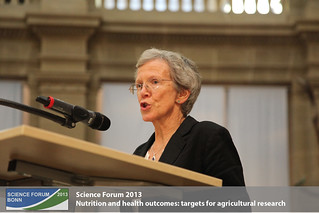 Maggie Gill, ISPC Council Member and Science Forum 2013 Chair
Funding bodies allocate funds for agricultural research institution in partner countries, with the role for its member organizations being to support European agricultural research and development to promote knowledge transfers. This would contribute to success of international agriculture research for development. System level-objectives of these funding bodies include reformation which focuses on reducing rural poverty, improving food security in terms of quantity, quality and affordability, improving nutrition and health, and a sustainable management of environment and natural resources.
Maggie Gill, ISPC Council Member and Science Forum 2013 Chair
Funding bodies allocate funds for agricultural research institution in partner countries, with the role for its member organizations being to support European agricultural research and development to promote knowledge transfers. This would contribute to success of international agriculture research for development. System level-objectives of these funding bodies include reformation which focuses on reducing rural poverty, improving food security in terms of quantity, quality and affordability, improving nutrition and health, and a sustainable management of environment and natural resources.
Welcome Address –“Tropentag 2013
Tue, 09/17/2013 - 20:39 — Pamella Ogada